Items
Mediator is exactly
Incarceration
-
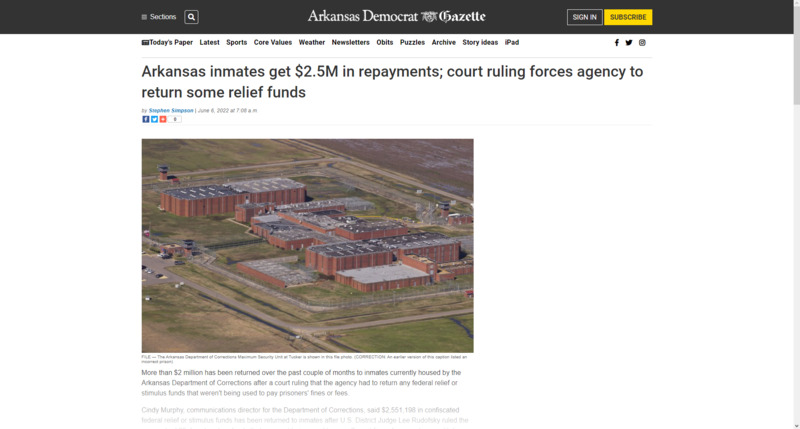 2022-06-06
2022-06-06Arkansas Prisoners and COVID Relief Payments
This article details a court ruling that requires the Arkansas Department of Corrections to pay out over $2.5 million dollars in withheld COVID relief money from the federal government. When COVID stimulus relief checks were rolled out, any money going to those incarcerated in Arkansas was immediately confiscated by the Arkansas Department of Corrections and placed within the state prison budget. Several inmates then sued the Department of Corrections demanding the payment of their stimulus. While the Department of Corrections alleged that they were entitled to the money due to the inmates being under their jurisdiction, this ruling requires the immediate repayment of all stimulus money. This story demonstrates not only a conflict within the Arkansas prison system, but also the tremendous legal questions the pandemic opened as well as the questionable conduct spurred by government officials in response. -
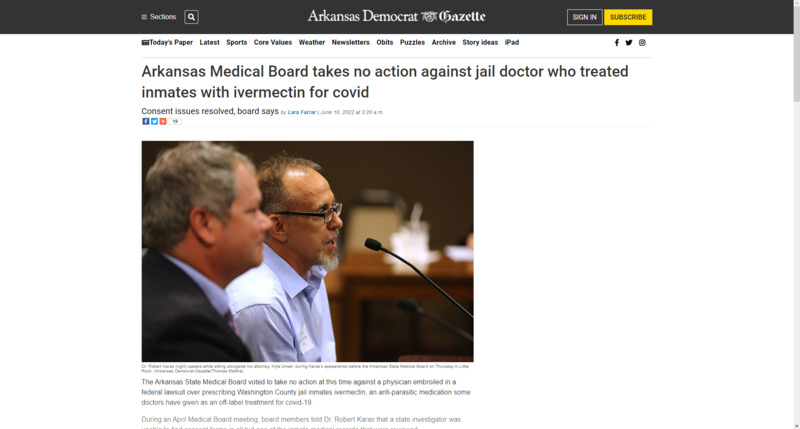 2022-06-10
2022-06-10Arkansas prison doctors and ivermectin
This is a story detailing Arkansas' Medical Board dismissing charges against a Washington County prison doctor for treating prisoners with ivermectin. Arkansas' Medical Board has not explicitly denounced the drug as a treatment for COVID-19, and many physicians prescribe the drug. This particular physician treated several unknowing prisoners with ivermectin in order to combat rising covid cases in the Washington County Jail in April. This dismissal of charges by the Medical Board reveals a deeper skepticism of the pandemic in Arkansas and a willingness of the board to allow physicians to treat their patients as they ultimately see fit with minimal regulations. I feel it also reveals a deeper understanding of Arkansas' prison system due to the prisoners not being informed of what was given to them, and therefore without consent. -
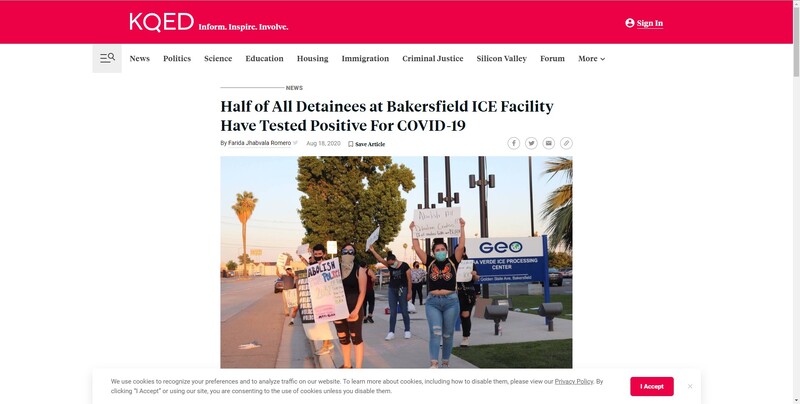 2021-01-01
2021-01-01How was life like before covid 19 impact happened
before the pandemic happened I didn't have to worry about getting sick with my weak immune system but when covid happened I had to take extra precautions on what I do so I wouldn't catch covid -
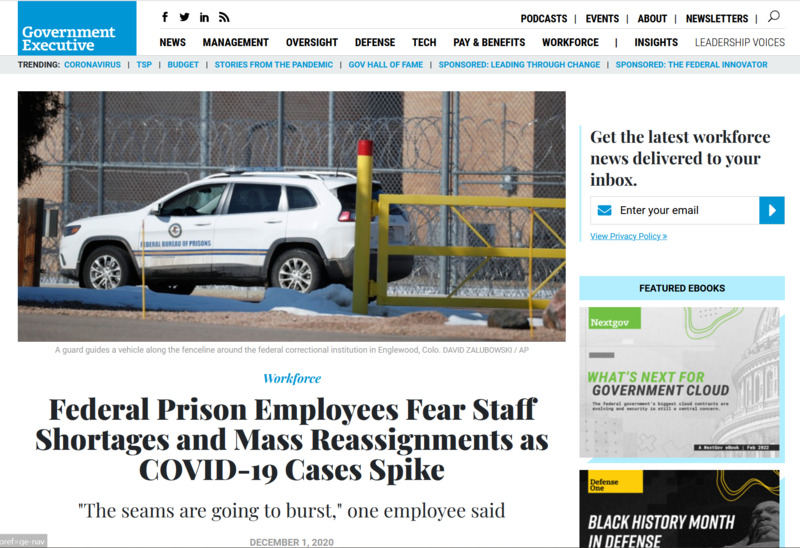 2022-03-26
2022-03-26Locked In and Locked Down: Surviving COVID-19 in FCI Edgefield BOP
The COVID-19 crisis has impacted mass incarcerated facilities at an exceeding rate, exacerbating existing staffing shortage and leaving those housed in large numbers increasingly vulnerable to COVID-19. The Federal Correctional Institution in Edgefield, South Carolina is no exception to this hardship. FCI Edgefield has be forced to expand its use of a practice called "augmentation" or allowing those in non-correctional roles at the prison to work in correctional officer roles. This is because staff members are getting sick an exceedingly high rate, causing some staff to have quarantine for several days while others have chosen to retire early out of the fear of high exposure and incentives losing way due to the crisis. Since the pandemic has taken off, only a small number of inmates have died from COVID-19, about 50 in total. Yet, due to less experienced staff on site due to shortages, one inmate died due to undermined symptoms on January 27, 2021. Overall, stories like these are important because they show how state officials, lawmakers, and policymakers have made little strides in reducing and slowing down the spread of the coronavirus in state and national prison systems. People like my mother, who works at FCI Edgefield, have preexisting medical conditions that put them at a heightened risk for complications if they were to catch COVID-19. Thus, we should make aware that these state officials have waited too long to make strides towards reducing the prison population, routinely rotating staff, and increasing social distance measures in the jail populations. As the pandemic wears on, much is still needed to be done in prioritizing staff and prison populations for vaccination matters. While this idea has generated some wide societal debate, I find it hard to argue that people who work and live in correctional facilities are at a major disadvantage in this crisis. Therefore, it is only fair to consider these high-risk groups first when prioritizing phases and measures of the vaccines and health and well-being. -
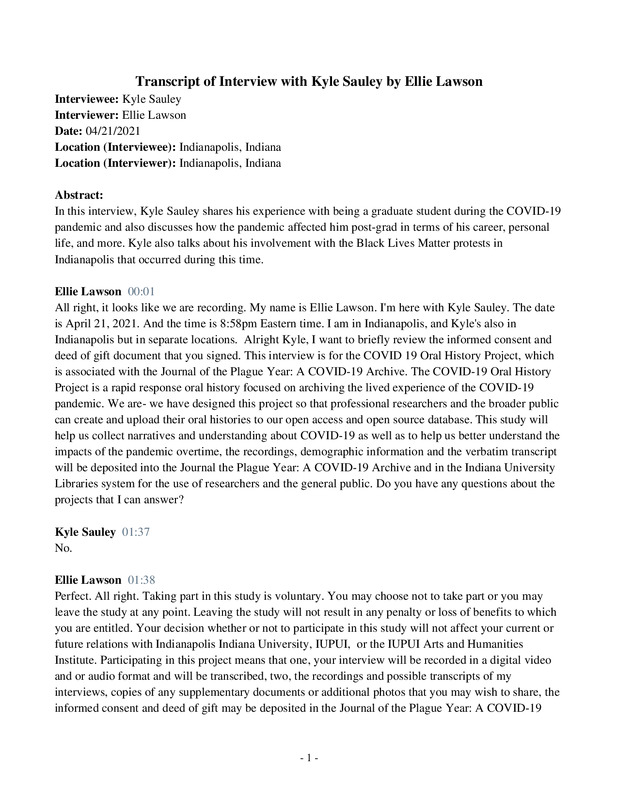 05/03/2021
05/03/2021Kyle Sauley Oral History, 2021/05/03
-
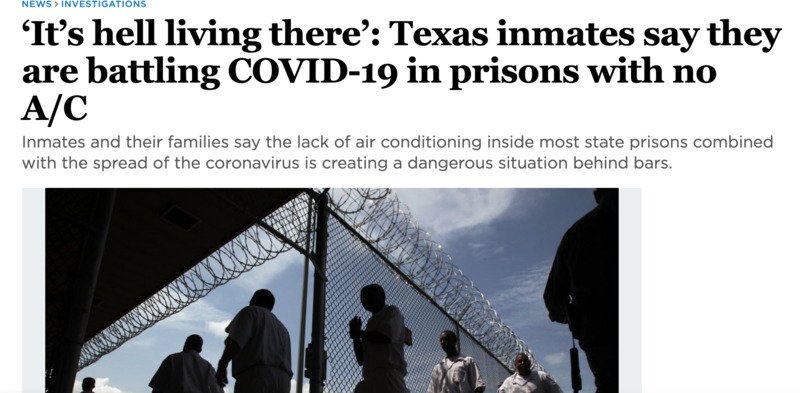 2021-10-04
2021-10-04Neglect of Prisoners
One of the examples of bigger issues coming to light during the pandemic. Not only were people in prisons fighting covid, but they're also continually dealing with a lack of resources such as basic air conditioning/ heat. -
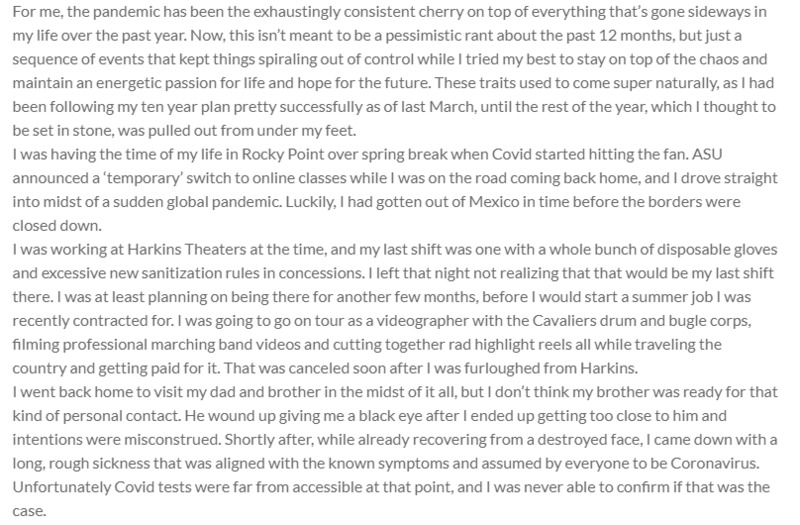 2021-04-23
2021-04-23My Chaotic Covid
For me, the pandemic has been the exhaustingly consistent cherry on top of everything that’s gone sideways in my life over the past year. Now, this isn’t meant to be a pessimistic rant about the past 12 months, but just a sequence of events that kept things spiraling out of control while I tried my best to stay on top of the chaos and maintain an energetic passion for life and hope for the future. These traits used to come super naturally, as I had been following my ten year plan pretty successfully as of last March, until the rest of the year, which I thought to be set in stone, was pulled out from under my feet. I was having the time of my life in Rocky Point over spring break when Covid started hitting the fan. ASU announced a ‘temporary’ switch to online classes while I was on the road coming back home, and I drove straight into midst of a sudden global pandemic. Luckily, I had gotten out of Mexico in time before the borders were closed down. I was working at Harkins Theaters at the time, and my last shift was one with a whole bunch of disposable gloves and excessive new sanitization rules in concessions. I left that night not realizing that that would be my last shift there. I was at least planning on being there for another few months, before I would start a summer job I was recently contracted for. I was going to go on tour as a videographer with the Cavaliers drum and bugle corps, filming professional marching band videos and cutting together rad highlight reels all while traveling the country and getting paid for it. That was canceled soon after I was furloughed from Harkins. I went back home to visit my dad and brother in the midst of it all, but I don’t think my brother was ready for that kind of personal contact. He wound up giving me a black eye after I ended up getting too close to him and intentions were misconstrued. Shortly after, while already recovering from a destroyed face, I came down with a long, rough sickness that was aligned with the known symptoms and assumed by everyone to be Coronavirus. Unfortunately Covid tests were far from accessible at that point, and I was never able to confirm if that was the case. Trying to get away from the bleak outlook of everything, I took a few of my friends up to my grandparent’s empty house in Sedona. My roommate proceeded to secretly bring alcohol, drank too much and fall off a ladder, leaving a large-man-sized hole in the wall of my grandparents’ expensive house. While staying in Sedona the following week on one of my trips to head up and fix the wall, I got a call from my dad that my mom had passed away. She had been suffering for the past twelve years from a stroke and aneurism she had when I was eight, and on April 6th she finally let go. So that was a lot of emotion to throw on top of everything. After spreading my mom’s ashes with my dad and brother, I came back to find a baby monitor camera had been hidden on a shelf in my bedroom. I didn’t know who put this camera there, hidden in a sock, but it had been filming my girlfriend and I for the past three days and had gotten some pretty personal stuff on camera. It wasn’t hard to put together that that was the whole point of the monitor. My roommate felt violated as well, as he said he thought it was one of his friends who had put it there, and was on board with the whole police investigation we launched after the fact. I trusted my roommate, and while he had gone through a bit of an alcoholic phase the month before, I thought he was doing better. He had been one of my best friends for over five years at this point, and I didn’t want the worst case to be possible. But a few weeks later, my girlfriend’s phone mysteriously went missing in my apartment for a night. The next day she found a monitoring app downloaded onto it. My roommate had taken her phone, copied off all of all her private, ‘personal’ images of herself, and installed a program to track her and check in on her camera and microphone without her knowledge. Luckily we found this evidence soon enough, but it wasn’t an enjoyable experience kicking my best friend out of our apartment. The police found evidence that he put up the camera soon after and he was arrested. Two counts of voyeurism, one count of lying to the police, and everything he had taken off my girlfriend’s phone. I haven’t talked to him since last May, I can’t legally, it’s currently April of ’21 and his trial has yet to reach sentencing. After all that had happened, Summer was not what I had initially thought it would be. But it wasn’t all that bad. People started wearing masks, I got a temporary job making dough at Little Caesars, I was able to hang with my actual friends and the worst of it looked to be over. And while that much was true, the pandemic itself was far from over and slowly the months of lost experiences and thoughts of unfulfillment and wasted potential began to sit in. I got a different apartment in August, but it was an older and more run-down first floor unit with unexplainably loud upstairs neighbors. I’ve spent the entire lease of that unit trapped inside and longing for a normal college experience. These were supposed to be the craziest years of my life, and I felt like I had missed out on countless memories. I was working as a video editor from home on top of online school, and the days blended together into hopeless rituals of helpless procrastination. The motivation to thrive while held up in the new apartment was hard to find. But I still made it. I didn’t give up on pushing forwards. I’d put things off and the passing of time ultimately became an illusion, but I kept making sure I stayed productive. I edited together a vlog series through the beginnings of the pandemic, worked on other personal projects, and was able to get a pretty sweet internship doing remote editing work for a television studio in LA that I ordinarily wouldn’t have been eligible for as in person work. I made it through the 2020-2021 school year, my junior year, with good grades and came out on the other side more hopeful than ever. I got fully vaccinated a few weeks ago, I’m beginning to live again, and the bright outlook of a fresh start in a soon to be newly reintegrated world gives me an unparalleled excitement. I am looking insanely forward to all the new people I’ll meet, memories I’ll make, and experience I’ll gain through my senior year being back in person. Everything’s coming back together, and as long as everyone can make an effort to get vaccinated and keep each other safe, calm, and hopeful, I’m more than prepared to cram 13 months of missed experiences into the best, jam-packed, fulfilling, productive and exciting year of my life. …Yet. -
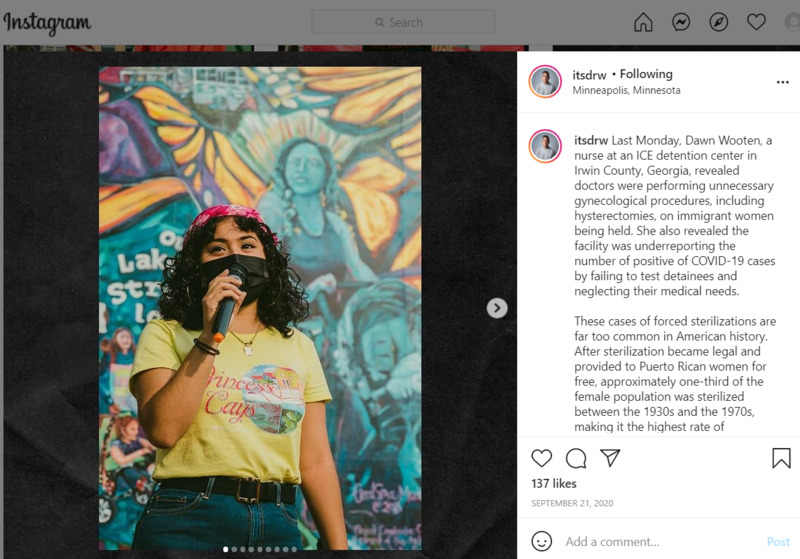 2020-09-21
2020-09-21Protests against ICE, Forced Sterilization and Under Reporting of Covid-19 Cases in Detention Centers
Last Monday, Dawn Wooten, a nurse at an ICE detention center in Irwin County, Georgia, revealed doctors were performing unnecessary gynecological procedures, including hysterectomies, on immigrant women being held. She also revealed the facility was underreporting the number of positive of COVID-19 cases by failing to test detainees and neglecting their medical needs. These cases of forced sterilizations are far too common in American history. After sterilization became legal and provided to Puerto Rican women for free, approximately one-third of the female population was sterilized between the 1930s and the 1970s, making it the highest rate of sterilization in the world. Health workers encouraged the procedure through door-to-door visits and employers showed favoritism towards sterilized women. I highly recommend a short documentary called La Operación available online about this US-imposed sterilization policy in Puerto Rico. -
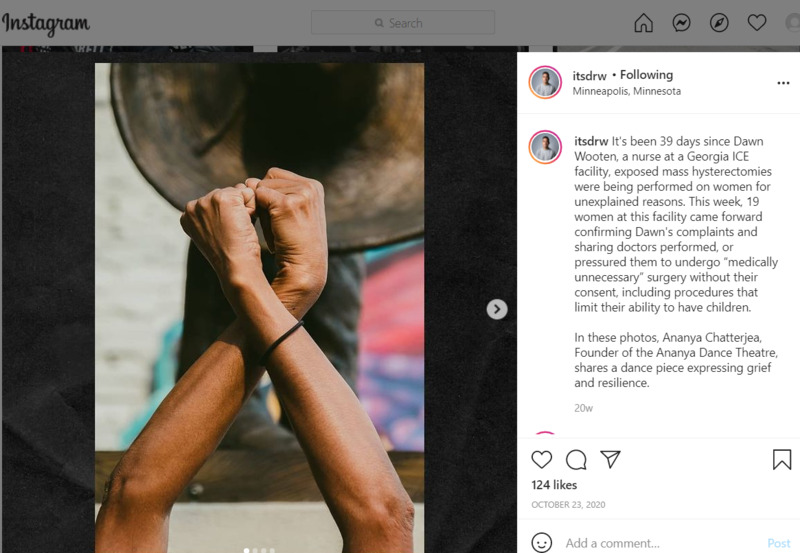 2020-10-23
2020-10-23Dance to Express Grief
It's been 39 days since Dawn Wooten, a nurse at a Georgia ICE facility, exposed mass hysterectomies were being performed on women for unexplained reasons. This week, 19 women at this facility came forward confirming Dawn's complaints and sharing doctors performed, or pressured them to undergo “medically unnecessary” surgery without their consent, including procedures that limit their ability to have children. In these photos, Ananya Chatterjea, Founder of the Ananya Dance Theatre, shares a dance piece expressing grief and resilience. -
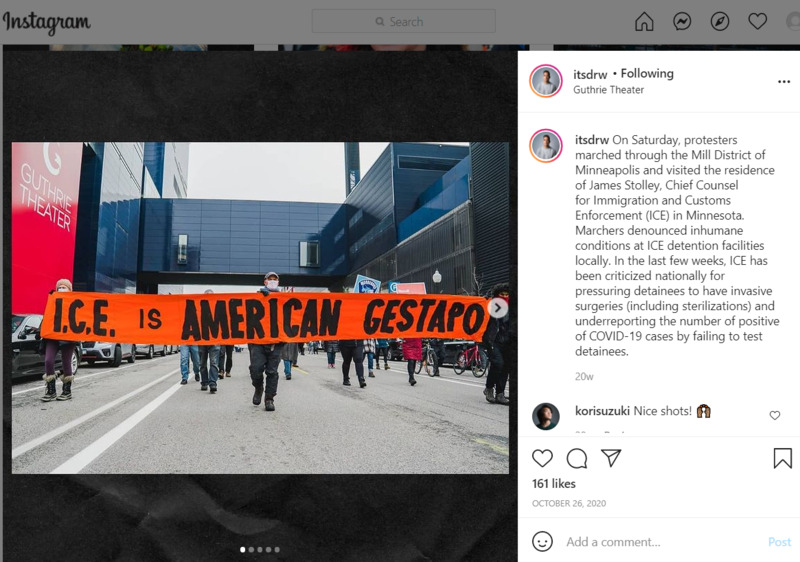 2020-10-26
2020-10-26Protesters Denounce Inhumane Conditions at ICE Detention Facilities
On Saturday, protesters marched through the Mill District of Minneapolis and visited the residence of James Stolley, Chief Counsel for Immigration and Customs Enforcement (ICE) in Minnesota. Marchers denounced inhumane conditions at ICE detention facilities locally. In the last few weeks, ICE has been criticized nationally for pressuring detainees to have invasive surgeries (including sterilizations) and underreporting the number of positive of COVID-19 cases by failing to test detainees. -
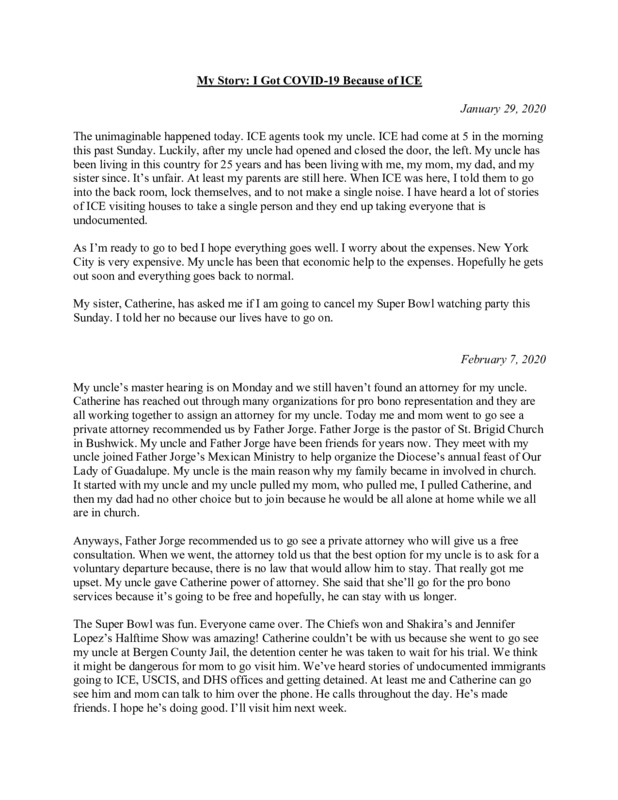 2021-02-14
2021-02-14My Story: I Got COVID-19 Because of ICE
I am sending a diary style writing where I share my experience during the pandemic. I focus on the issue of ICE during the pandemic. Before the lockdowns, my uncle was detained by ICE and was deported during the pandemic. My uncle has been living in the US for 25+ years and Mexico, my uncle's home country, has changed a lot since he last lived there. For that reason, I went to Mexico to take him home. This made me get COVID. -
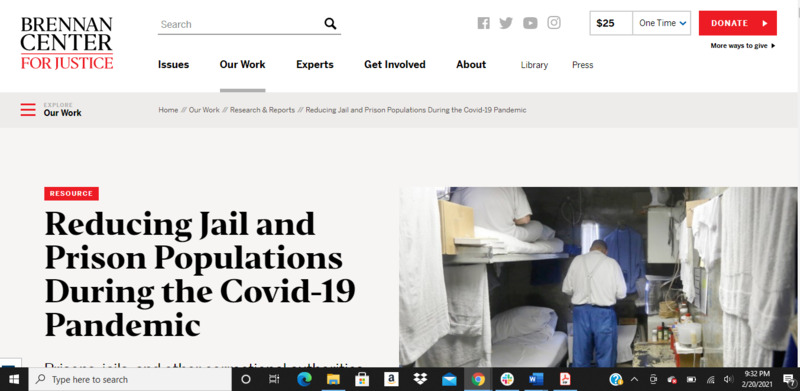 2021-02-05
2021-02-05Reducing Jail Sentences for Inmates with Preexisting Health Conditions
The study conducted by the Brennan Center for Justice (BCJ) found that prisons, jails, and detention facilities are rushing to make an effort to release unnecessarily incarcerated people to improve healthcare and conditions of confinement for the remaining inmate population. As part of a larger project to end mass incarceration, the BCJ analyzed the unique health challenges posed by the inmate population both 65 and older, as well as those with preexisting medical conditions. "Brennan Center Recommendation: Elderly and sick people and those incarcerated for parole violations should be released or recommended for release under compassionate release provisions or another authority. Barring that, prison officials should use their discretion to transfer people to community corrections options." -
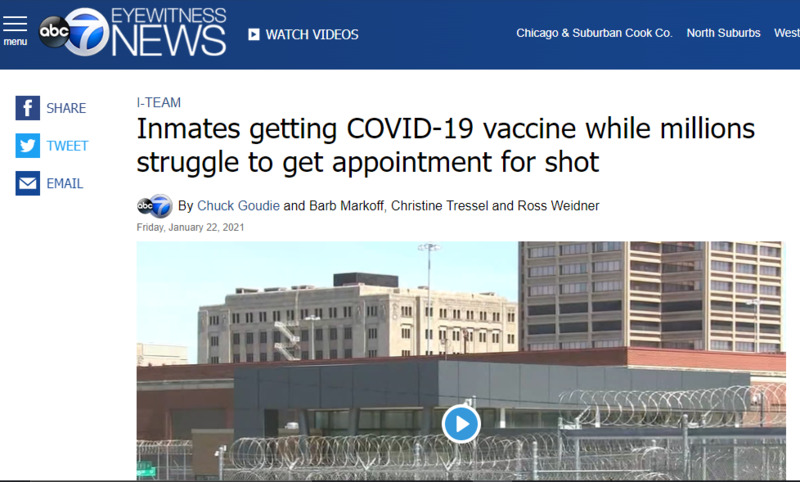 2021-01-22
2021-01-22Prisoner Vaccinations
Prisoners are currently at the top of the list to receive the COVID-19 vaccine with outcry from the public. People believe that prisoners should not be receiving the vaccine and are upset that they are ahead of those who they deem more "deserving." One reason prisoners are getting the vaccine ahead of others is that they have a communal living situation and cannot socially distance which is a stipulation stated in phase 1 of the vaccine distribution. The outrage further reveals people don't view prisoners as human or even deserving of basic human rights or decency. It is also interesting that there isn't as much public outcry over politicians who downplayed the vaccine or elders who may not have been adhering to COVID guidelines receiving the vaccine first. -
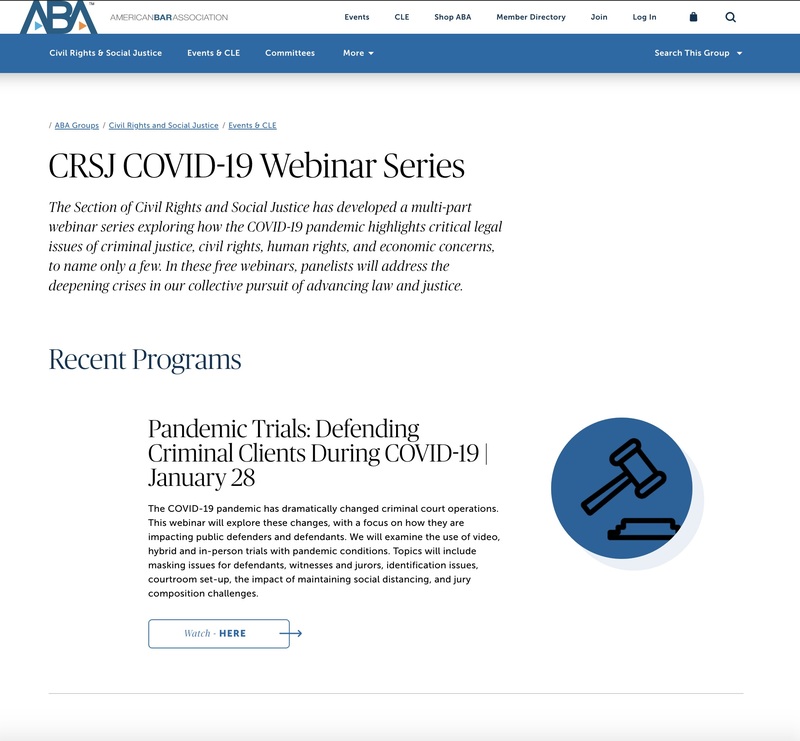 2021
2021CRSJ COVID-19 Series
The American Bar Association is hosting a series of webinars on various social Justice issues and how they relate to Covid-19. Webinars include: Pandemic Trials: Defending Criminal Clients During COVID-19. New Jersey COVID-19 Jail Release Agreement. Expanding Pretrial Release in the Age of COVID-19. Implications of the COVID-19 Pandemic on African Americans and Communities of Color. COVID-19 and the Compassionate Release of the Elderly, Infirm or High Risk. Reentry Planning for COVID-19 Releases. Issues Affecting Native American Communities During the COVID-19 Crisis. COVID-19 and Child Welfare Cases. Coronavirus: Homeless Community Adverse Impact from Eviction & Lack of Safe Housing. Public Health Measures In Response to COVID-19 (CLE), Lessons from Past Disasters: Criminal Justice Response to COVID-19. COVID-19: Threats to Democracy and to Public Safety Through the Lens of the Asian American Experience. Religious Freedom Implications of the COVID-19 Pandemic. Disability Discrimination in the Rationing of Life Saving COVID Treatment: Who Gets Left Behind? This is not the full list. -
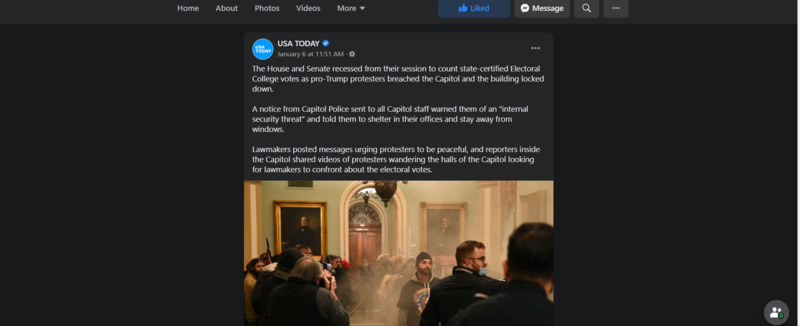 2021-01-06
2021-01-06"internal security threat"
From post: The House and Senate recessed from their session to count state-certified Electoral College votes as pro-Trump protesters breached the Capitol and the building locked down. A notice from Capitol Police sent to all Capitol staff warned them of an "internal security threat" and told them to shelter in their offices and stay away from windows. Lawmakers posted messages urging protesters to be peaceful, and reporters inside the Capitol shared videos of protesters wandering the halls of the Capitol looking for lawmakers to confront about the electoral votes. Photo shows mayhem in the Capitol. Some masked. Was this a super spreader event? -
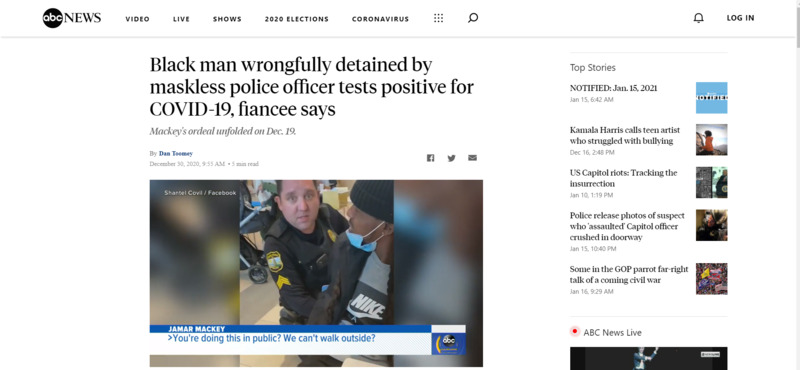 2020-12-30
2020-12-30Black man wrongfully detained by maskless police officer tests positive for COVID-19, fiancee says
Excerpt from article: A Black man who was detained by police in Virginia Beach, Virginia after being suspected for a crime he did not commit, has tested positive for the coronavirus, according to his fiancée, Shantel Covil. -
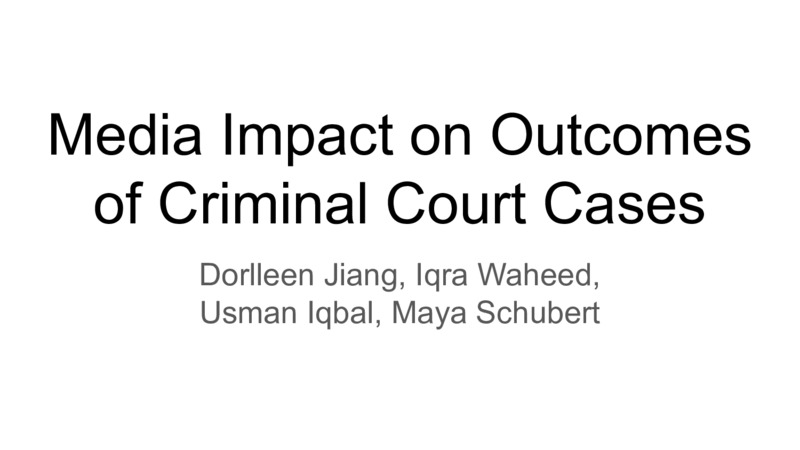 2020-12-05
2020-12-05Media Impact on Outcomes of Criminal Court cases
This is a good way of seeing if media changes the mind of people -
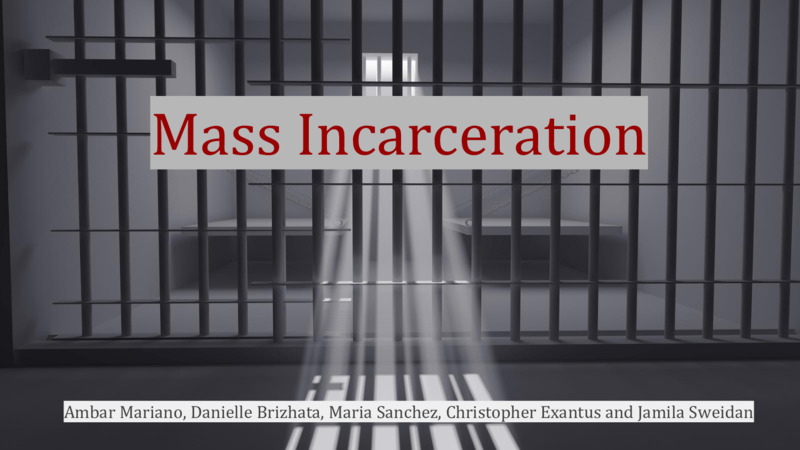 2020-12-04
2020-12-04Mass Incarceration & COVID-19
It is important to know that even during a pandemic mass incarceration is still going on. -
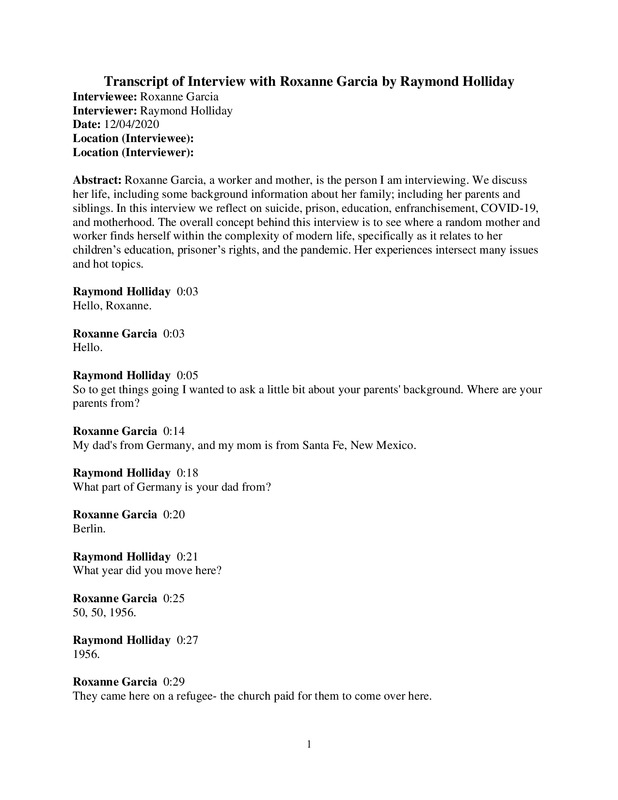 2020-12-04
2020-12-04Roxanne Garcia Oral History, 2020/12/04
Roxanne Garcia, a worker and mother, is the person I am interviewing. We discuss her life, including some background information about her family; including her parents and siblings. In this interview we reflect on suicide, prison, education, enfranchisement, COVID-19, and motherhood. The overall concept behind this interview is to see where a random mother and worker finds herself within the complexity of modern life, specifically as it relates to her children’s education, prisoner’s rights, and the pandemic. Her experiences intersect many issues and hot topics. -
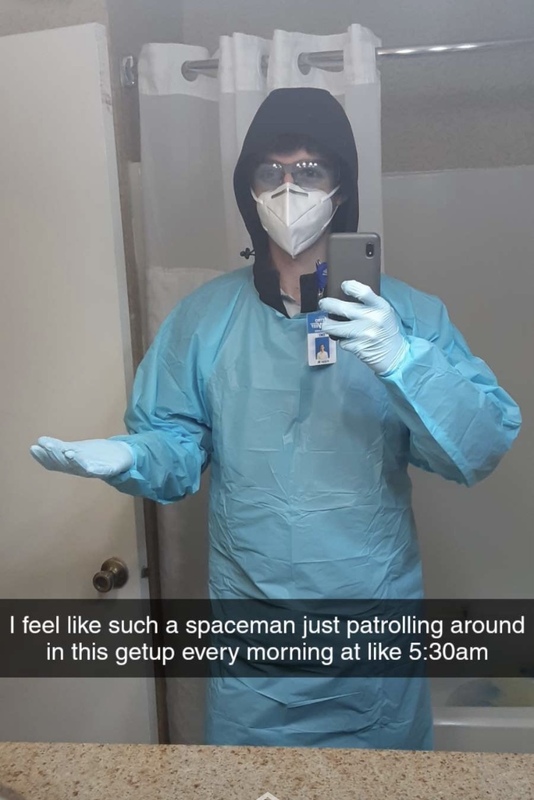 2020-10-23
2020-10-23Voluntary Isolation Motel EMT
Several counties across Oregon have coordinated with local motels to establish voluntary isolation shelters in an attempt to curb the spread of COVID-19. Each location is staffed with city personnel to manage admittance and discharge, while EMTs on staff conduct routine medical monitoring to patients. My boyfriend works in one of these shelters, and sent me this picture of him in his full PPE getup before making morning rounds. The shelter's capacity varies a lot week by week, and anywhere from 1-20 COVID positive patients may be staying there at any given point. This particular motel intakes prisoners who need to do a 2 week quarantine before being released, but also serves non-incarcerated people who have tested positive. -
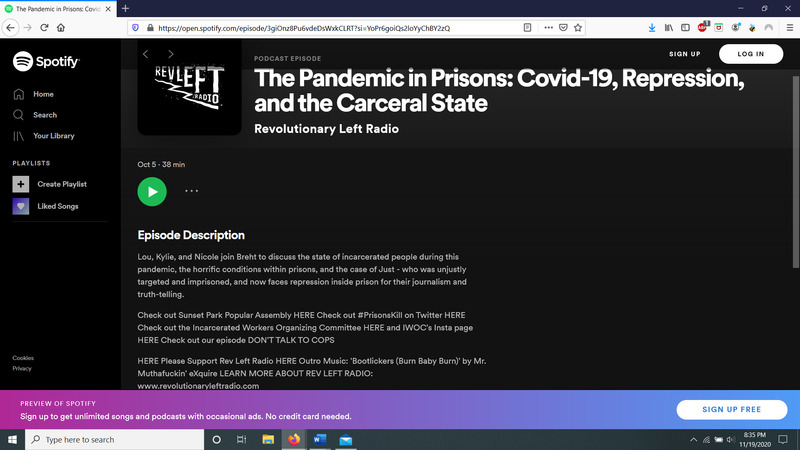 2020-10-05
2020-10-05The Pandemic in Prisons: Covid-19, Repression, and the Carceral State
This podcast episode is from the Revolutionary Left Radio podcast featuring show host Breht and guests. -
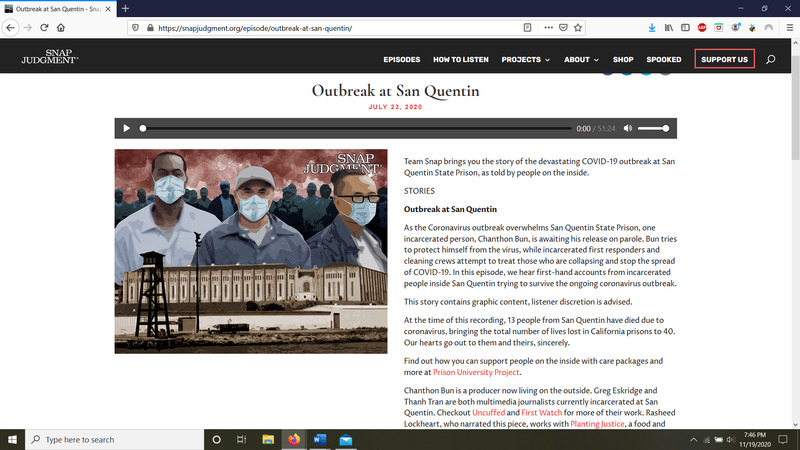 2020-07-23
2020-07-23Snap Judgment podcast episode on covid-19 in San Quentin state prison (CA)
Podcast episode produced by Snap Judgment in which they look at covid-19 outbreaks in San Quentin prison -
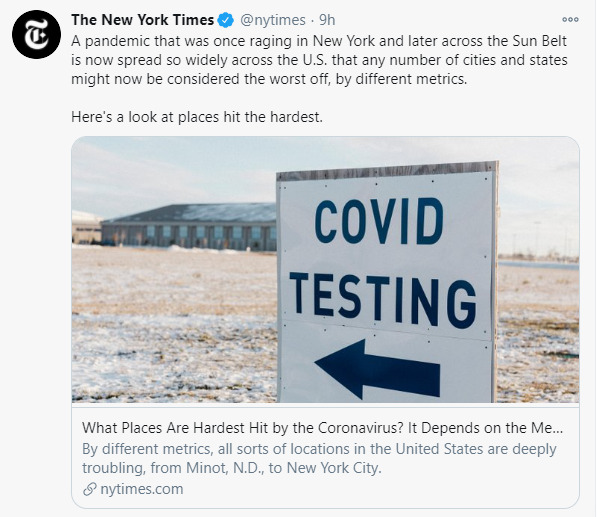 2010-11-12
2010-11-12COVID-19 is so bad in the US we can't even decide who has it the worse
The US literally cannot determine which state has the worst COVID infections because it's all just bad. -
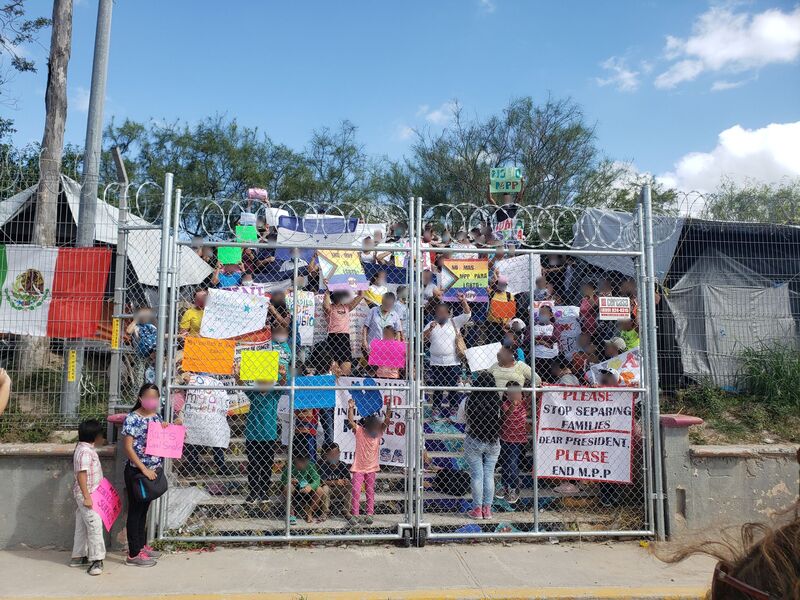 2020-10-25
2020-10-25Trapped at the Border: Asylum seekers protest Matamoros camp conditions
On October 25, 2020, over fifty of 1000+ people in the Matamoros Border Camp gathered along the barbed-wire fence to protest their living conditions. The Migrant Protection Protocols (M.P.P.), a Trump Executive Order, requires many Spanish-speaking asylum seekers to stay in Northern Mexico until granted a court date. In March 2020, the administration sealed U.S. borders and closed immigration courts as part of the COVID-19 emergency response. Many asylum seekers trapped in the camps may never get a full hearing. Although protests could provoke retaliation from Mexican and U.S. immigration officials, these families demonstrated because they felt desperate. As in much of the southern border, cartels plague the Brownsville-Matamoros region. Many South and Central American migrants have experienced kidnapping, theft, extortion, and rape on their journeys through Mexico. In the camps, bounded by a fifteen-foot fence and heavily armed security forces, they face daily threats from poisonous snakes, hurricanes, flooding, and unsanitary conditions. Because the Mexican government does not give camp occupants sufficient resources, nonprofit organizations like Catholic Charities and Team Brownsville provide food, water, and medical care. On the day of the protest, two U.S. citizens from a Methodist ministry stood with demonstrators inside the camp. The asylum seeker who organized this demonstration sent her two daughters (ages 9 and 11) across the Rio Grande, accompanied only by a cartel-affiliated coyote (guide), to turn themselves into Customs and Border Protection (CBP). While she misses her daughters every day, she believes that separation is safer for them than remaining in Mexico or returning to Honduras. She trusts that God will protect everyone in the Matamoros camp because their cause is just. After the protest, I held her hand through the gate’s wire diamonds and promised to pray. Some protesters held signs with Bible verses like Matthew 25:35-40, while others called for the protection of LGBTQ+ migrants and an end to MPP. Many protesters addressed the U.S. presidential election. Voten inteligentemente, one sign reads – vote intelligently. Joe Biden promised that, if elected, he would repeal M.P.P. within the first hundred days of his presidency. Asylum seekers realize that without a leadership change, they have very little chance of entering the U.S. I witnessed this reality while I stood in an hour-long customs line, waiting to cross the International Bridge back into Brownsville. The line held a mix of Mexican and U.S. citizens, including a family carrying spider-shaped piñatas and orange-frosted cupcakes for a Halloween party. A group of two adults and three children passed me in line. I watched them approach CBP officers, a journalist following close behind. Five minutes later, a security officer was escorting the family back to Matamoros. The journalist noticed me watching and stopped to explain: “They asked for asylum, but CBP said no. They have to wait in Mexico.” “No somos malas personas. Solo queremos vivir.” The mother repeated this phrase like a mantra as she passed us, holding her six-year-old daughter’s hand. We are not bad people. We just want to live. *This is a photograph that I took on my cell phone outside the Matamoros, Mexico border camp on Sunday, October 25, 2020. Faces are blurred to protect their privacy. -
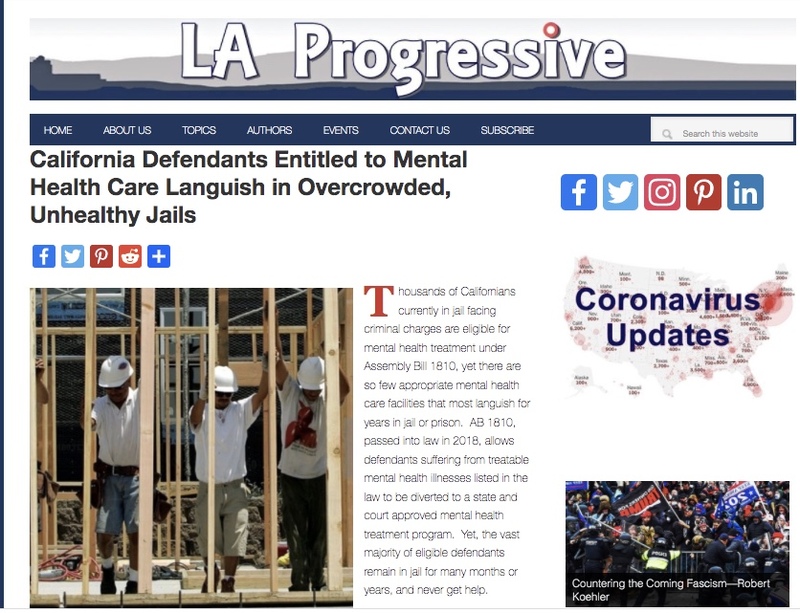 2020-10-19
2020-10-19California Defendants Entitled to Mental Health Care Languish in Overcrowded, Unhealthy Jails FacebookTwitterPinterestRedditShare
The writers’ son is a patient with mental health-related rights that have gone unfulfilled, along with thousands of others, in the downtown Los Angeles jail nicknamed the Two Towers. -
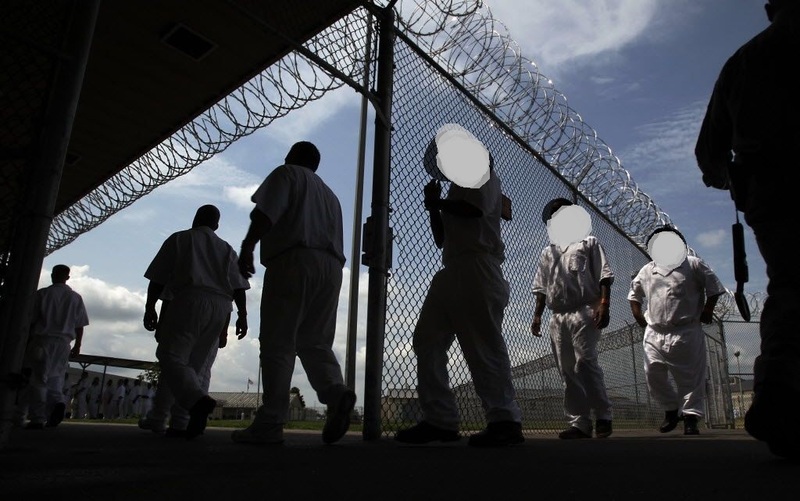 2020-07-31
2020-07-31‘It’s hell living there’: Texas inmates say they are battling COVID-19 in prisons with no A/C
Conditions in Texas prisons notoriously unhealthy, these inmates face inhumane living conditions during a pandemic. -
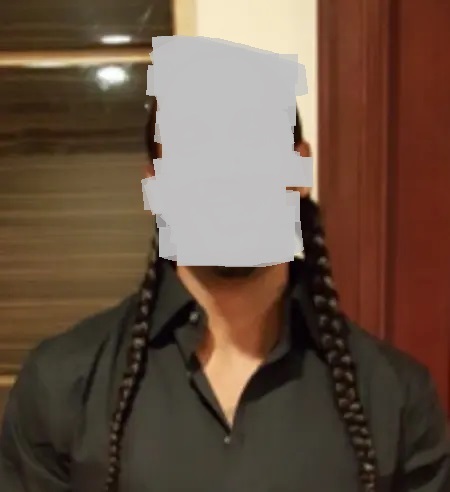 2020-08-14
2020-08-14Texas prison system still tops US in virus cases, as deaths and criticism mount
A father who has been incarcerated for 30 years holds a baby prior to imprisonment; this man died in prison without seeing his family during the last months of his life. -
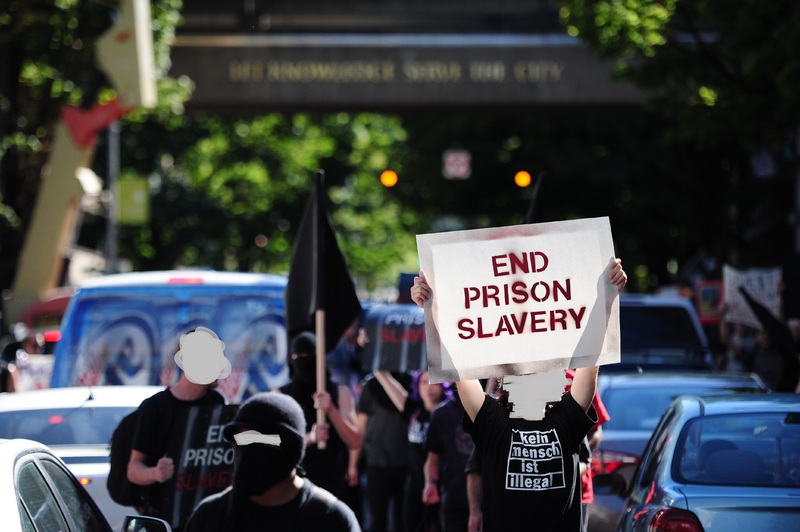 2019-05-10
2019-05-10The Penal System Today is Slavery’: Lawmakers Finally Start to Talk About Unpaid Labor in Texas Prisons
Protestors demonstrate in public against the abuse of prison inmates forced to work for slave wages in unhealthy conditions. -
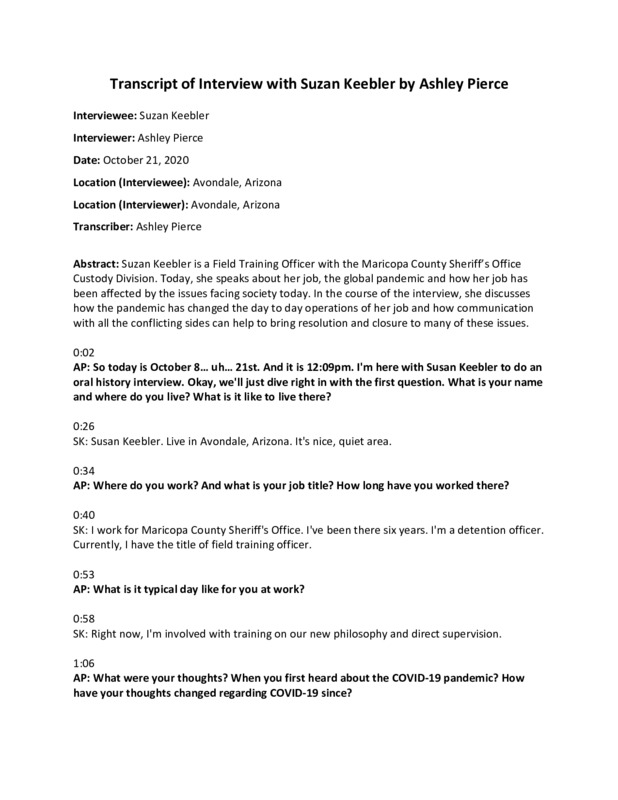 10/21/2020
10/21/2020Suzan Keebler Oral History, 2020/10/21
Suzan Keebler is a Field Training Officer with the Maricopa County Sheriff’s Office Custody Division. Today, she speaks about her job, the global pandemic and how her job has been affected by the issues facing society today. In the course of the interview, she discusses how the pandemic has changed the day to day operations of her job and how communication with all the conflicting sides can help to bring resolution and closure to many of these issues. -
2020-10-11
California kept prison factories open. Inmates worked for pennies an hour as COVID-19 spread
The state is responsible for the spread of covid19 from the neighboring men’s institution to the women’s institution, leading to death. -
2020-10-24
COVID-19 cases increase at California Institution for Men
This is an article about a state prison in Chino, California. The state could be responsible for the increase in covid19 cases in the Institution. -
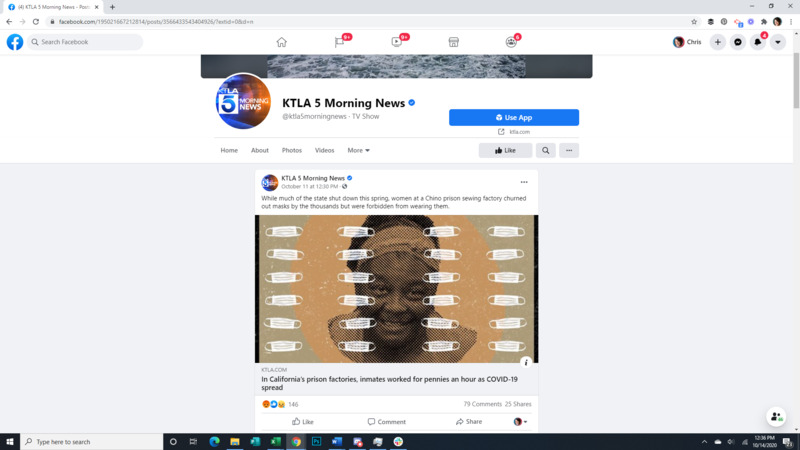 2020-10-11
2020-10-11In California’s prison factories, inmates worked for pennies an hour as COVID-19 spread
This article highlights the changes that have been made inside US correctional facilities during the Covid-19 pandemic. While visitation, religious services, rehab and educational programs, phone usage, and even showers have been cut down or completely eliminated, prison labor continues. Incarcerated people are also not able to refuse to work. Doing so can result in loosing privileges time added onto a sentence, or loss of parole or release. In this particular article when the prison was confronted with the worry over the virus being spread through work they defended their position saying they only continued work in places that produced items necessary to fight the pandemic such as soap, hand sanitizer, and masks. While much of the spread of Covid-19 in correctional facilities has been linked to the transfer of inmates this article highlights another avenue for spread, the movement of materials to make things such as masks. The women in one prison were making masks using fabric produced by the men's prison next door. The driver that delivered the fabric from the men's prison was not wearing a mask or taking other precautions. -
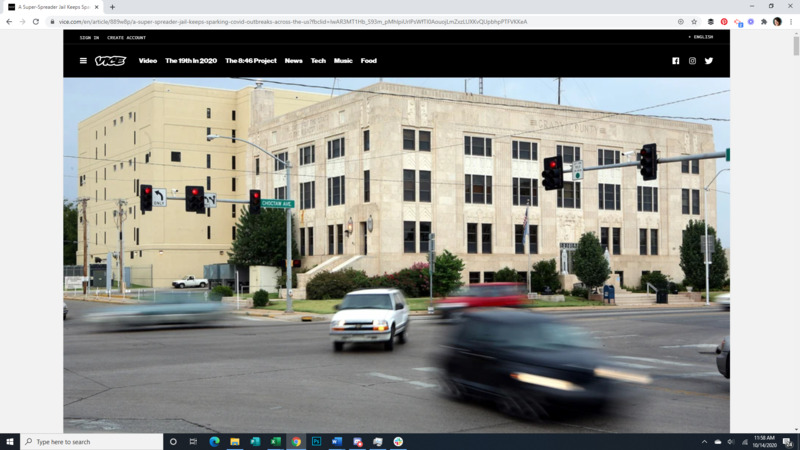 2020-10-13
2020-10-13A Super-Spreader Jail Keeps Sparking COVID Outbreaks Across the U.S.
When Covid-19 put much of the U.S. on lockdown one of the things that kept everyone entertained and sane was binge watching streaming services like Netflix and Amazon. One of the breakout hits was a show called Tiger King. This news story explains how the "Tiger King's" stay at a local jail while waiting to transfer into the federal prison system, like many others across the country, has resulted in the spread of COVID-19 through out correctional facilities. While is seems obvious how much time, man power, and money it would take to transfer incarcerated people between facilities safely it is outrageous that US Marshalls were giving people fever reducers like Tylenol so that they would pass a temperature check and their transfer would continue. -
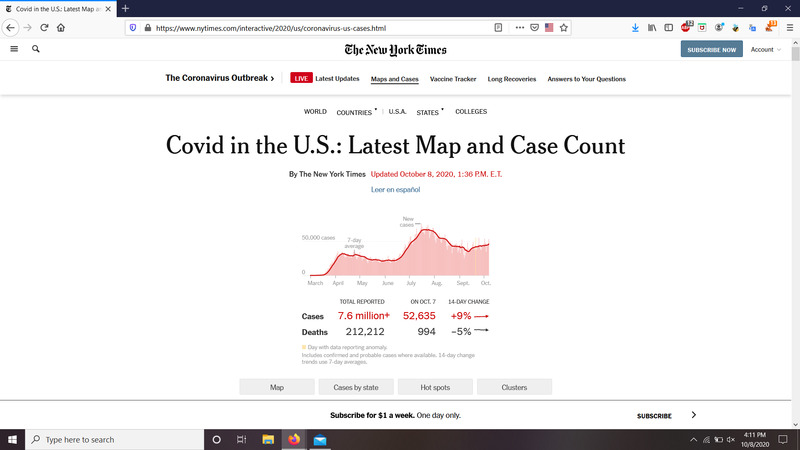 2020-10-07
2020-10-07Covid in the U.S: Latest Map and Case Count
The New York Times article accurately stated new information and articulated ideas that grasped my attention. The death rate, the number of infected individuals, the number of cases in certain location, and credible data were the main points the news article covered. The main ideas allowed people to fully understand the significance of the pandemic affecting the environments dynamic worldwide. I choose this article because as I was looking through my options, I noticed this specific article has tons of information that is credible. To add, this article focuses on not just one main idea, but lot of facts that intertwine with one another, which gives the full scope of the situation occurring. The article discussed the number of deaths and cases along with specific places that are being impacted the most. To add, New York Times mentioned how the lives of innocent people in America, “has been fundamentally reordered because of the virus. Concerts, parades and high school football games continue to be called off. Countless people have found themselves jobless and struggling to afford housing”. This ties into why the news article is important and what it reveals about the life during the pandemic. Historians can use this article in an archive, which will allow them to compare it to other sources and understand what was going on during this time period. With multiple different sources from different points of views and perspectives it can be very helpful for someone to thoroughly analyze for future reference. The bias in the news article is neutral and not bias, which is significant when focusing on the clear credible data given. I can tell that it is neutral because the article doesn’t lean toward a specific side, which I personally really like. With that being said the media as a whole is responsible for making sure that each and every individual is aware of the circumstances going on. It is important for the media to stay transparent without sharing fake news and a biased standpoint that would persuade people in the wrong direction. As a whole the media needs to be regulated and changed for the future because it plays a huge role in billions of people’s lives. -
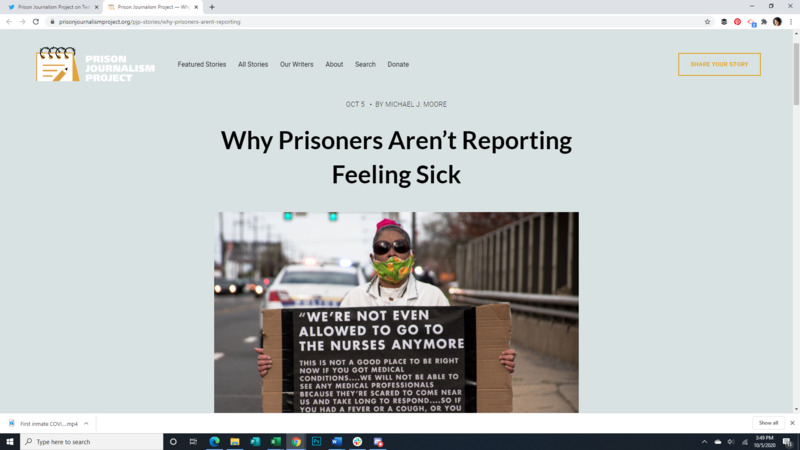 2020-10-05
2020-10-05Why Prisoners Aren’t Reporting Feeling Sick
Prisons and jails were not planned or constructed with thoughts of weathering a pandemic, not was the system of incarceration. For these reasons, and our cultures current view of incarcerated people as less than human, many are suffering in silence. This article explains why incarcerated people are choosing not to tell anyone if they experience symptoms that might be from COVID-19. -
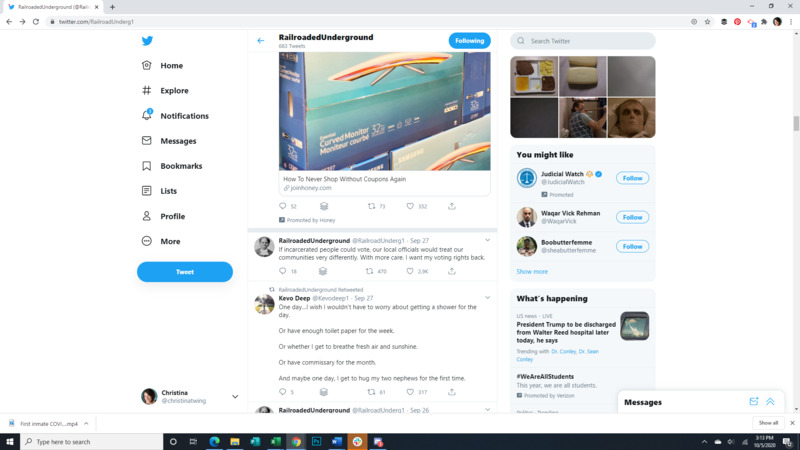 2020-09-27
2020-09-27Tweets from Inside a Prison 09/27-10/03/2020 by Railroad Underground
These images show the Tweets of an incarcerated person utilizing a contraband cell phone to let the outside world know about prison conditions during the pandemic. This week he talks about the ability of incarcerated people to vote would cause them to be treated better, living like a caged animal, lockdown, going outside, mental health, watching presidential debates in prison, a second Covid outbreak happening in his prison, how important family connection is, incarcerated people are eligible for a stimulus check, people of color being the majority of incarcerated people and the majority of Covid deaths, difference of sentencing of white and black people, -
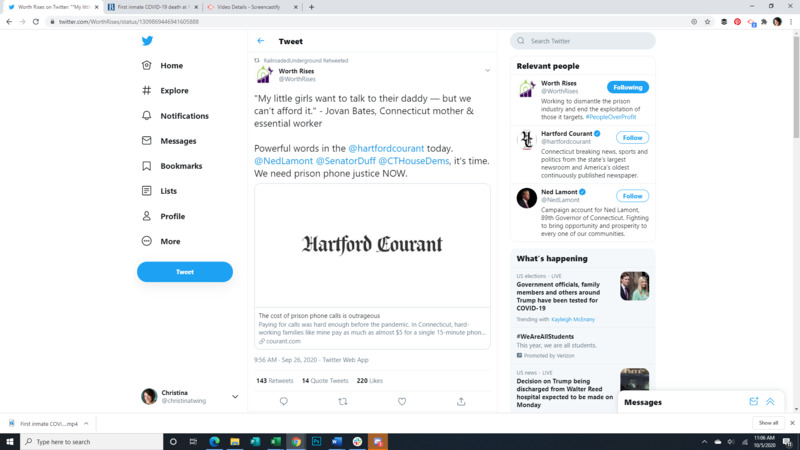 2020-09-26
2020-09-26The Cost of Prison Phone Calls Prevents Family Communication, Especially During Covid
Phone calls from incarcerated persons to their families has always been expensive but what many don't realize is that the pandemic has made it even worse. Back in March when much of the nation shut down to prevent the spread of Covid-19 the nations correctional facilities closed as well. Families could not longer visit their loved ones. There have been times when phone calls were also stopped because of the transmission possible through sharing phones and just having people out of their cells. But once phone calls were allowed families faced a new crisis, being able to afford the phone calls. Fees for phone calls from an incarcerated person are charged to the recipient of the call or to the prisoners personal account and cost a lot per minute. With so many people out of work due to the pandemic families are faced with the decision to speak with their incarcerated loved one or buy groceries or pay the rent. This article shares the story of one mother and the impossible decision she is faced with every time her phone displays a call from her incarcerated husband. -
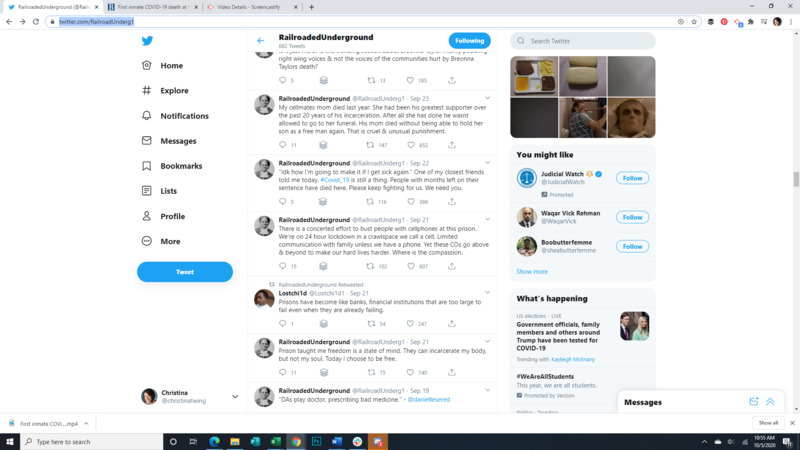 2020-09-20
2020-09-20Tweets from Inside a Prison 09/20-09/26/2020 by Railroad Underground
These images show the Tweets of an incarcerated person utilizing a contraband cell phone to let the outside world know about prison conditions during the pandemic. This week he talks about mind, body, soul, freedom, effort to locate contraband cell phones, lack of compassion, support, Breonna Taylor, the rule against shaking a free persons hand, using the word inmate removes humanity, prisons acting as a herd immunity experiment, journalists profiting from the pain of incarceration, and rock bottom. -
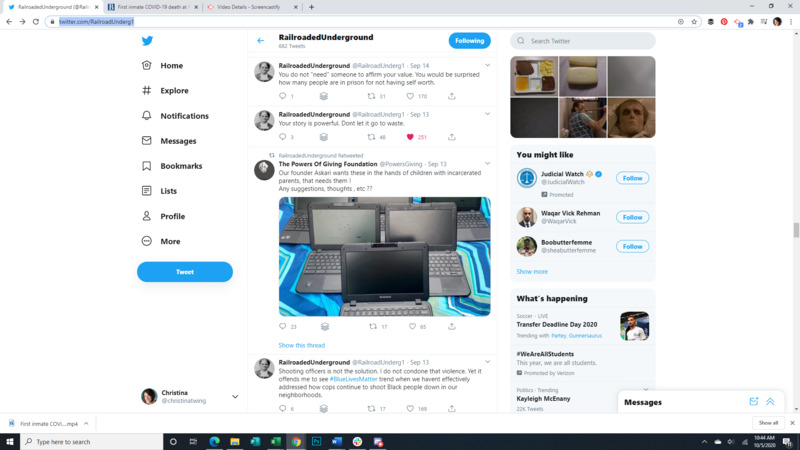 2020-09-13
2020-09-13Tweets from Inside a Prison 09/13-09/19/2020 by Railroad Underground
These images show the Tweets of an incarcerated person utilizing a contraband cell phone to let the outside world know about prison conditions during the pandemic. This week he talks about #BlueLivesMatter, police shootings, and violence, self worth, parenting from prison, fighting for justice, trauma, reading, meditation, protests, Ruth Bader Ginsburg's death, and district attorneys. -
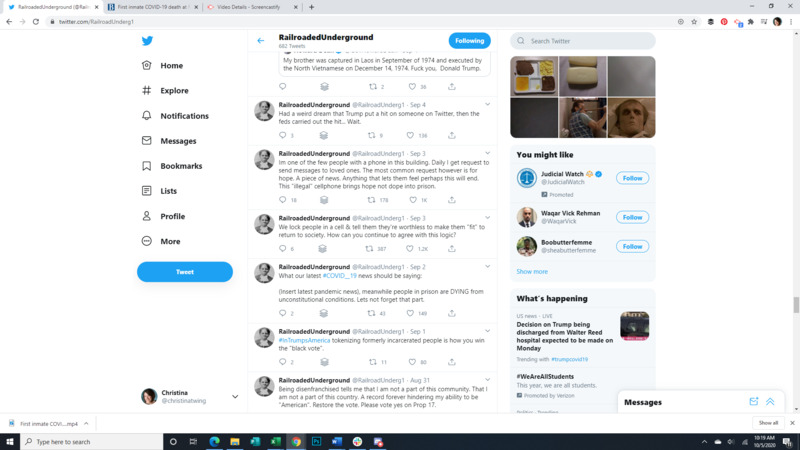 2020-08-30
2020-08-30Tweets from Inside a Prison 08/30-09/05/2020 by Railroad Underground
These images show the Tweets of an incarcerated person utilizing a contraband cell phone to let the outside world know about prison conditions during the pandemic. This week he talks about forever loosing his right to vote because he is now a felon, the logic of incarceration where people are told everyday how worthless they are as a way to make them "fit" into society, the daily request he receives to send or receive messages on his contraband cell phone, that the phone represents hope, a dream about Donald Trump, he never had role models growing up but now has them inside prison and they are other incarcerated people, and his greatest fear is not knowing. He says that used to relate to not knowing when he would get out, or if his parents would die before he is released but Covid has changed this into not knowing when he will be allowed to shower or get a bar of soap. -
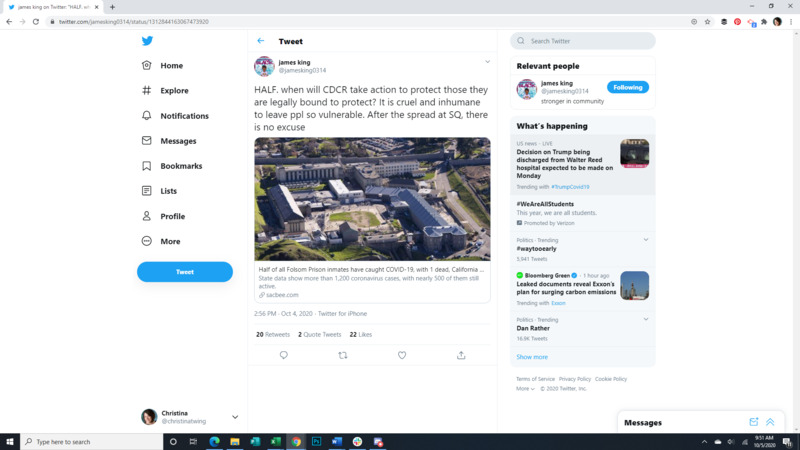 2020-10-04
2020-10-04Half of Folsom Prison Inmates Have Covid
Nursing homes and prisons provide the perfect breading ground for coronavirus. For this reason the nation's correctional facilities have been hard hit by the virus. This Tweet, by James King, a formerly incarcerated man, draws attention to the continued spread of the virus within Folsom Prison in California. The news story King links to in his Tweet contains a video of Governor Gavin Newsom explaining the measures already taken to mediate the spread of the virus and upcoming plans. In the video Newsom mentions several things that alarmed me. 1. Numerous individuals with active Covid infections were released from California correctional facilities. Was this a wise decision? Or was it the smart decision that shows compassion for the individual. Prison is no place to suffer through a horrible illness. 2. When talking about releasing people from correctional facilities early he stresses these were individuals who are "non, non, non, non sex offenders". This sounds like they are only considering releasing those convicted of non-violent crimes, but isn't there a chance someone who has spent 20+ years in prison been reformed? Isn't that the point of incarceration, to reform the person? 3. There are individuals that meet the criteria laid out for early release but they have no where to go or no plan. In speaking with criminal justice reform advocates in California personally I was told there are numerous non-profit organizations ready to assist anyone that is released early. -
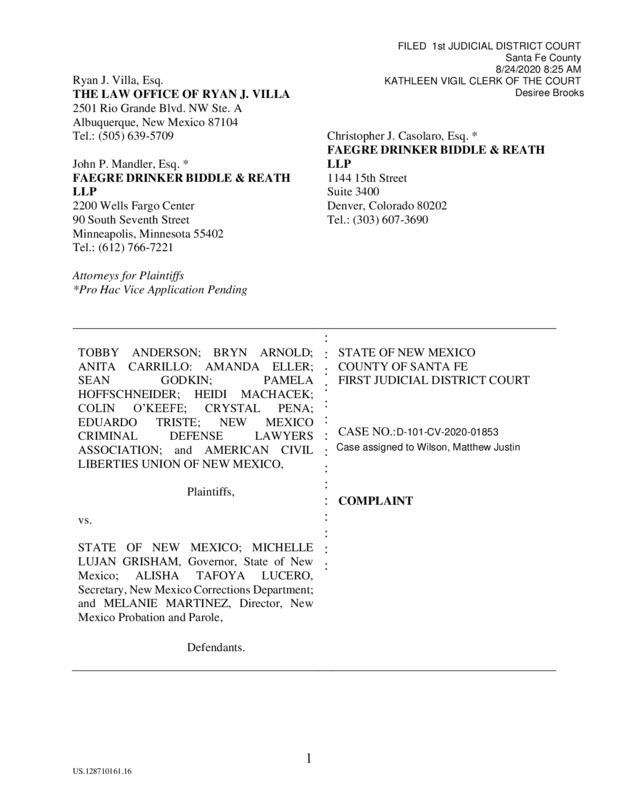 2020-08-24
2020-08-24ACLU of New Mexico Files Class-Action Lawsuit Against the State of New Mexico
The ACLU of New Mexico joined forces with both local and international law firms to file a class-action lawsuit against the state of New Mexico. The lawsuit states that the state of New Mexico has failed to protect the lives and constitutional rights of people held in the correctional system. HST580, ASU, New Mexico Narratives, New Mexico, lawsuit, constitutional right, correctional system, ACLU, incarceration, loss, death, safe practice -
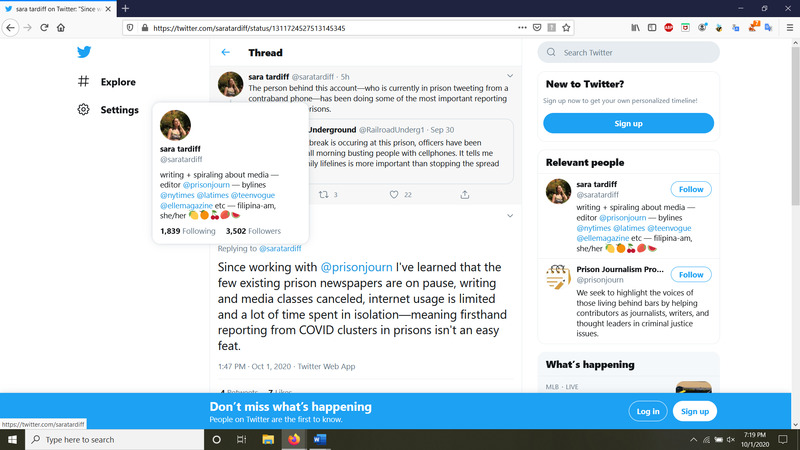 2020-10-01
2020-10-01Prisons Are Mostly Closed to Journalist During Covid
As this Tweet from journalist, Sara Tardiff, explains prisons are closed as a precaution to slowing the spread of Covid-19. This means one of our only windows into what is actually happening behind bars is coming from incarcerated persons using contraband cell phones. -
2020-10-01
The COVID Pandemic and economic greed
I wanted to share a bit about my life during COVID. My brother is currently incarcerated, and I would travel at least once a month to visit him. Once COVID hit, visitations were canceled, and my family was forced to rely on phone calls or snail mail. My brother would call us about once a week for his own sanity and ours as well. Several things have happened these past few months, which made our situation as a family more complicated. A phone call to my brother used to cost him (or us) 40 cents a minute. When COVID hit the private company used by the prison to facilitate calls, decided to take advantage of our reliance on phone calls and upcharge their prices. Phone calls now cost over a dollar a minute. Thankfully my family does ok and phone calls are not something we are willing to let go of, but I feel for families who have to choose between food, bills or funding their calling account. I know it sounds like an extreme situation, but there are families that have lost all contact with their loved ones who are incarcerated because of COVID, and these companies are taking advantage of the pandemic. Were now paying almost twenty dollars for every ten minute conversation, trust me it adds up real quick. The worst part is that these companies have contracts with the prisons, and we (the families on the outside) have no choice or say as far as what company we are able to go through to talk to those incarcerated. As if COVID and social distancing weren't enough, I'm now missing and worrying about my brother more than usual. -
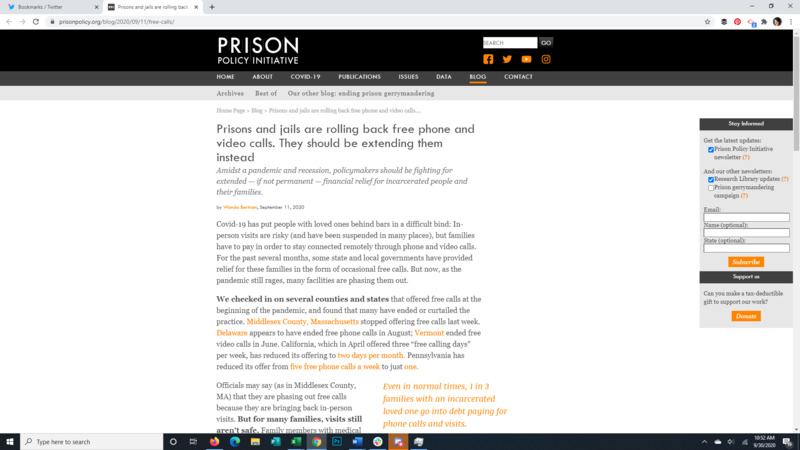 2020-09-11
2020-09-11Prisons and Jails Are Rolling Back Free Phone Calls
When Covid-19 hit the US many things shutdown including the nation's prisons. Of course they kept taking in people for incarceration but they no longer allowed visitors. This made connection to the outside world through phone calls even more important. What many people don't know is that each phone call an incarcerated person makes costs money, a lot of money. In the beginning of the pandemic many jails and prisons offered free phone calls, in the case they were even allowing phone calls (that's another story) but as the pandemic has continued for nearly eight months phone calls are no longer free or reduced cost. This is an undue burden on a population that is facing high unemployment. -
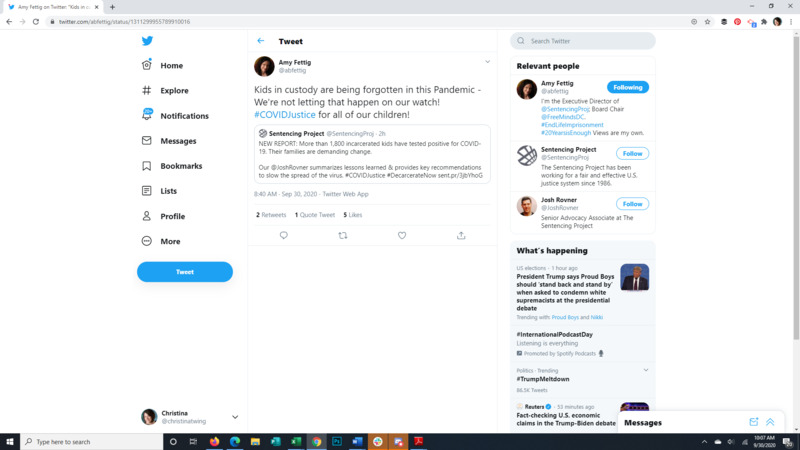 2020-09-30
2020-09-30Incarcerated Children Are Getting Covid Too
Months ago the media did report on the outbreak of Covid cases in the nations jails and prisons. Though Covid continues to spread in correctional facilities it seems to have largely fallen off the media's radar and I haven't seen any coverage of the children in correctional facilities who are also sick with Covid. It saddens me to even write this because the phrase "incarcerated children" should not have meaning. -
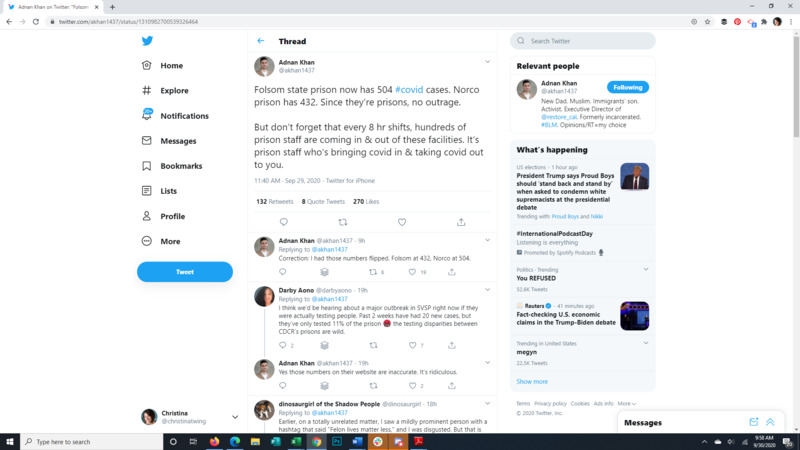 2020-09-29
2020-09-29Incarcerated people are humans, with human rights
This series of Tweets illustrates the number of Covid cases inside of prisons that go largely unnoticed by the general public. It also points to a larger problem of seeing "inmates", those who should be referred to in people first language as incarcerated persons, as fully human. -
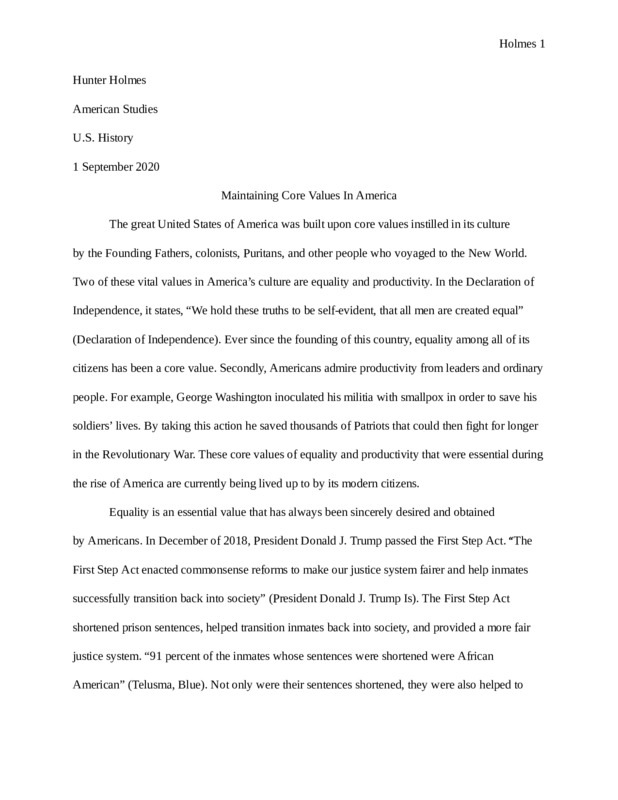 2020-09-05
2020-09-05Maintaining Core Values In America
I believe that America is living up to it's current values that rose with the start of this great country. Values of equality and productivity. -
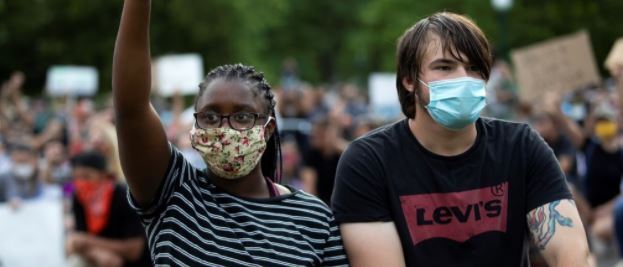 2020-09-08
2020-09-08Disconnect from our Core Values
This assignment is part of the American Studies classes at California High School in San Ramon, California. -
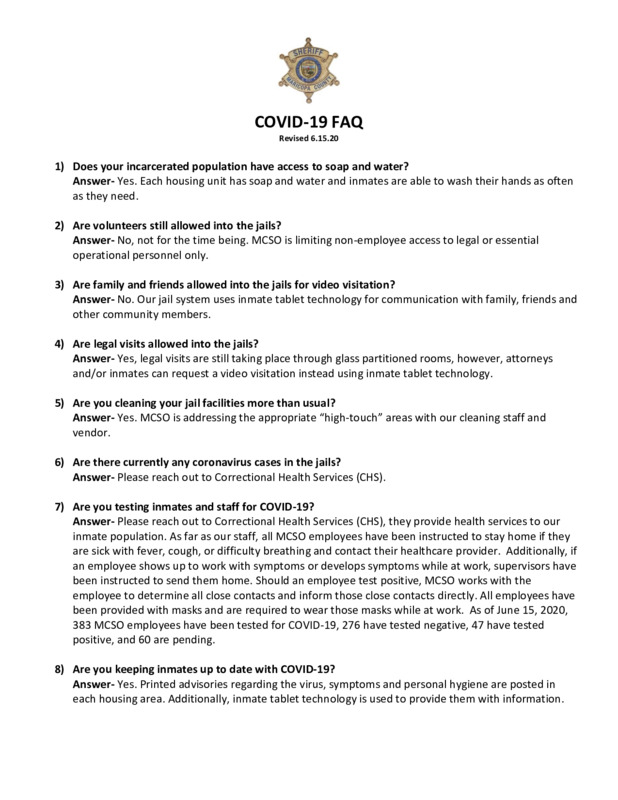 2020-06-15
2020-06-15Maricopa County Sheriff's Office answers Frequently Asked Questions regarding Covid-19
This is a list of questions posed to the Maricopa County Sheriff's Office regarding department policies and procedures regarding the Covid-19 pandemic. This list was made to provide answers to the public regarding safety and security issues within the jails. The questions range from how many active cases are present in the jail (as of date of publication) to how/when inmates are released to availability of cleaning supplies and personal protective equipment.
